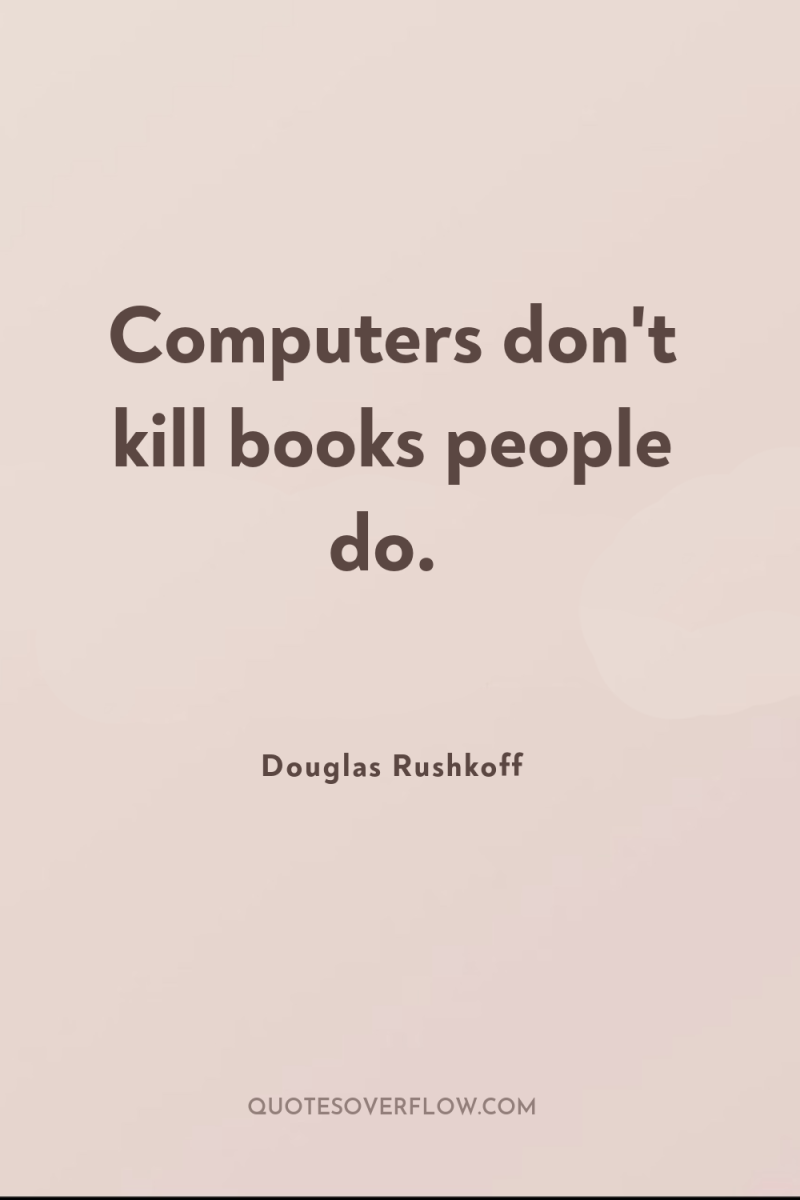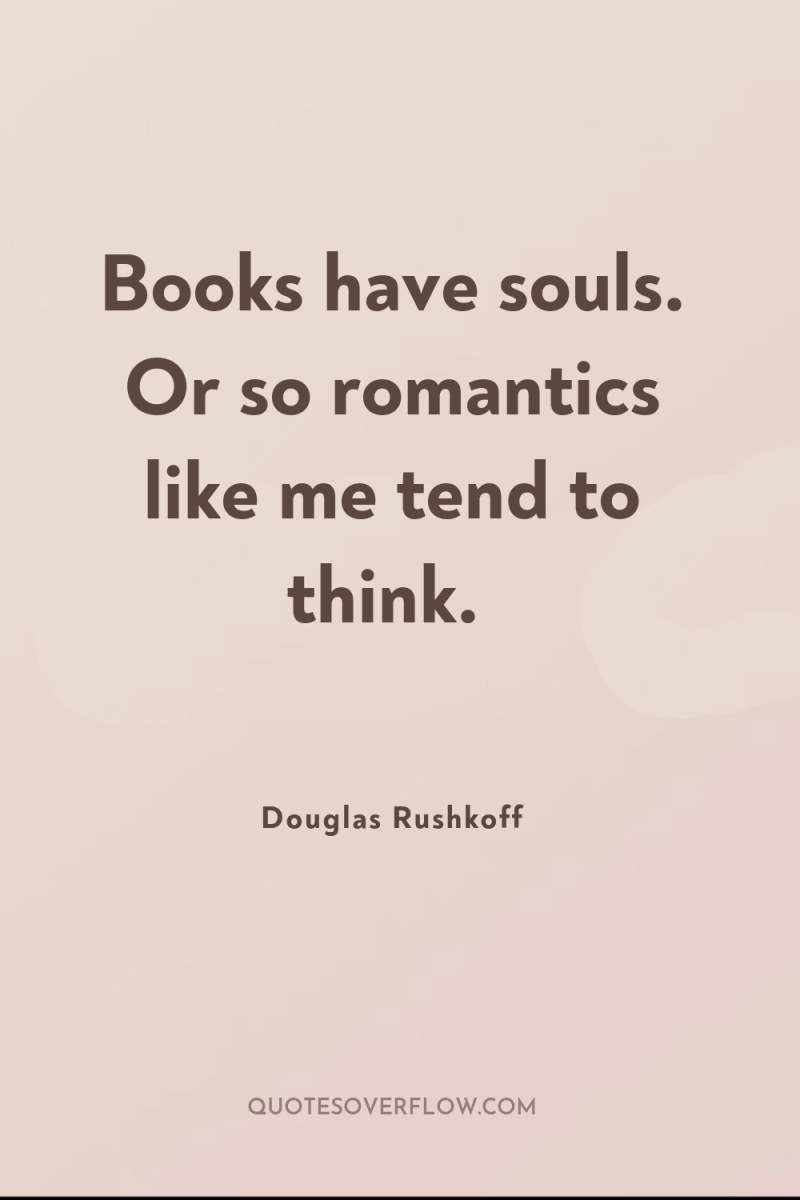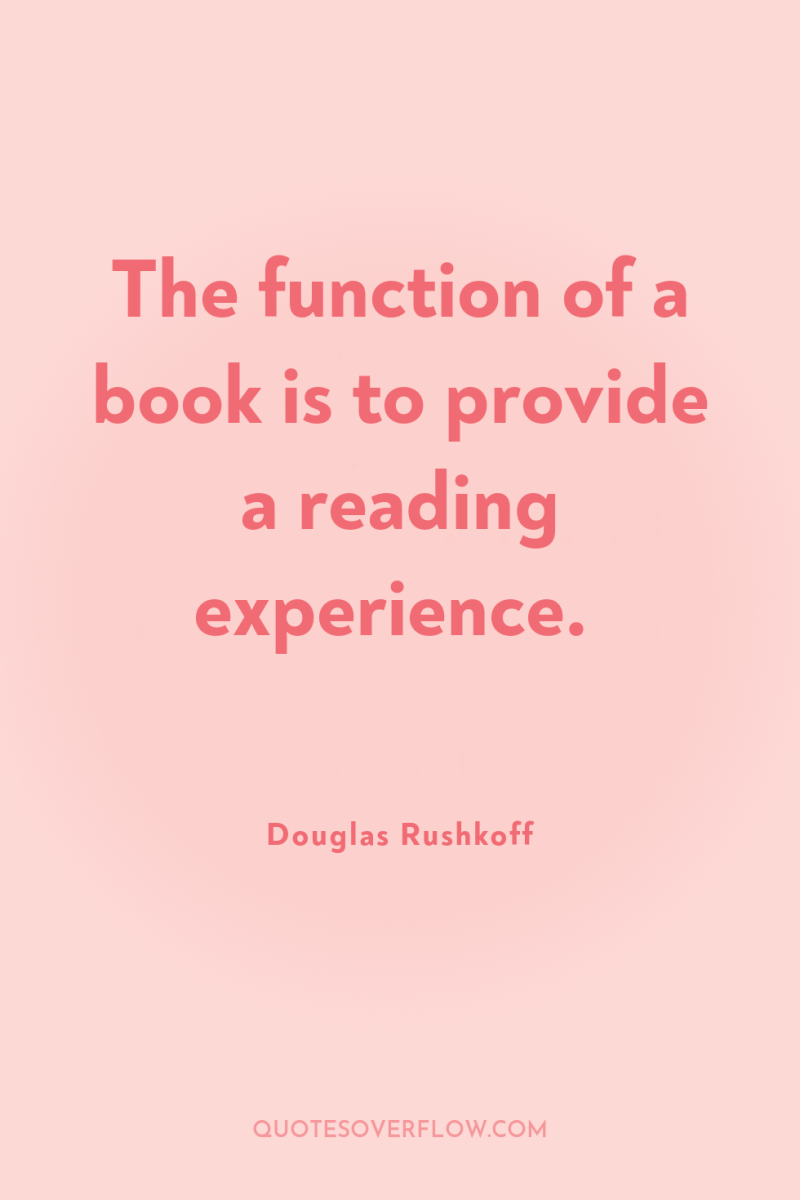1
If we could stop thinking of 'meaning' and 'purpose' as artifacts of some divine creative act and see them instead as the yield of our own creative future, they become goals, intentions and processes very much in reach rather than the shadows of childlike, superstitious mythology.Douglas Rushkoff

2
Computers don't kill books people do.Douglas Rushkoff

3
Books have souls. Or so romantics like me tend to think.Douglas Rushkoff

4
The function of a book is to provide a reading experience.Douglas Rushkoff
5
Corporations [gained] direct access to what we may think of as our humanity, emotions, and agency but, in this context, are really just buttons.Douglas Rushkoff
6
Fantasy sports went a long way toward developing the sabermetrics formulas used not only by oddsmakers but general managers in hiring players. So the amateur fantasists ended up creating some of the algorithms that Oakland GM Billy Bean's statisticians used to win games with less salary money available for star players.Douglas Rushkoff
7
Technology has moved away from sharing and toward ownership. This suits software and hardware companies just fine: They create new, bloated programs that require more disk space and processing power. We buy bigger, faster computers, which then require more complex operating systems, and so on.Douglas Rushkoff
8
Most of us still haven't grasped the fact that everything we commit to the digital space - not just our public blogs and broadcast tweets, but every private text message, email, and voicemail is likely to be stored and accessible. Forever.Douglas Rushkoff
9
Google did a great job hacking the Web to create search - and then monetizing search with advertising. And Apple did a great job humanizing hardware and software so that formerly daunting computers and applications could become consumer-friendly devices - even a lifestyle brand.Douglas Rushkoff
10
People are seduced by signals from the world, but that is manipulation, not reality. Computers have learned more about us than we've learned about them.Douglas Rushkoff
11
When Steve Jobs toured Xerox PARC and saw computers running the first operating system that used Windows and a mouse, he assumed he was looking at a new way to work a personal computer. He brought the concept back to Cupertino and created the Mac, then Bill Gates followed suit, and the rest is history.Douglas Rushkoff
12
Brains are tricky and adaptable organs. For all the 'neuroplasticity' allowing our brains to reconfigure themselves to the biases of our computers, we are just as neuroplastic in our ability to eventually recover and adapt.Douglas Rushkoff
13
The early cyberpunk idea was that networked computers would let us do our work at home, as freelancers, and then transact directly with peers over networks. Digital technology would create tremendous slack, allow us to apply its asynchronous, decentralized qualities to our own work and lives.Douglas Rushkoff
14
Everyone knows, or should know, that everything we type on our computers or say into our cell phones is being disseminated throughout the datasphere. And most of it is recorded and parsed by big data servers. Why do you think Gmail and Facebook are free? You think they're corporate gifts? We pay with our data.Douglas Rushkoff
15
Not only have computers changed the way we think, they've also discovered what makes humans think - or think we're thinking. At least enough to predict and even influence it.Douglas Rushkoff
16
The reason why Apple computers have worked so well over time is that, unlike Microsoft, they don't bend over backward to be compatible with every piece of hardware or software in the digital universe. To code or create for Apple, you follow Apple's rules. If you're even allowed to.Douglas Rushkoff
17
When things begin accelerating wildly out of control, sometimes patience is the only answer. Press pause.Douglas Rushkoff
18
Once a teen has been identified as part of the 'target market, ' he knows he's done for. The object of the game is to confound the marketers, and keep one's own, authentic culture from showing up at the shopping mall as a prepackaged corporate product.Douglas Rushkoff
19
The industrial age was not about craftspeople trading peer to peer. It was about stopping that. You weren't supposed to be a craftsperson, you were supposed to be an employee.Douglas Rushkoff
20
I think there can be a positive sort of futurism even in a presentist society. But I think it's a kind of futurism that envisions augmenting human ability and intellect rather than creating some artificial machine intelligence that displaces us.Douglas Rushkoff
21
As a digital technology writer, I have had more than one former student and colleague tell me about digital switchers they have serviced through which calls and data are diverted to government servers or the big data algorithms they've written to be used on our e-mails by intelligence agencies.Douglas Rushkoff
22
In the digital universe, our personal history and its sense of narrative is succeeded by our social networking profile - a snapshot of the current moment. The information itself - our social graph of friends and likes - is a product being sold to market researchers in order to better predict and guide our futures.Douglas Rushkoff
23
What's it like to envision the ten-thousand-year environmental impact of tossing a plastic bottle into the trash bin, all in the single second it takes to actually toss it? Or the ten-thousand-year history of the fossil fuel being burned to drive to work or iron a shirt? It may be environmentally progressive, but it's not altogether pleasant.Douglas Rushkoff
24
Every new computer program is basically doing some task that a person used to do. But the computer usually does it faster, more accurately, for less money, and without any health insurance costs.Douglas Rushkoff
25
As popular culture becomes more presentist, we move away from entertainment as the vicarious experience of a narrative - as watching someone else's story - and much more toward enacting one's own story. Moving away from myths and toward fantasy role-playing games, away from movies and toward videogames.Douglas Rushkoff
26
The new Zune may not be an i Pod killer, but it does offer a clean interface, great industrial design, HD radio, and a subscription model for music, making it significantly less expensive for big users.Douglas Rushkoff
27
Digital technology is both arousing and distancing. We don't look at the users on the other side as people. They aren't - they're just usernames, Facebook photos and Twitter handles.Douglas Rushkoff
28
I am much less concerned with whatever it is technology may be doing to people that what people are choosing to do to one another through technology. Facebook's reduction of people to predictively modeled profiles and investment banking's convolution of the marketplace into an algorithmic battleground were not the choices of machines.Douglas Rushkoff
29
We Facebook users have been building a treasure lode of big data that government and corporate researchers have been mining to predict and influence what we buy and for whom we vote. We have been handing over to them vast quantities of information about ourselves and our friends, loved ones and acquaintances.Douglas Rushkoff
30
Marketers use big data profiling to predict who is about to get pregnant, who is likely to buy a new car, and who is about to change sexual orientations. That's how they know what ads to send to whom. The NSA, meanwhile, wants to know who is likely to commit an act of terrorism - and for this, they need us.Douglas Rushkoff
31
I think the only way to behave is as if nothing is private. And then fight to make what you care about legal and acceptable.Douglas Rushkoff